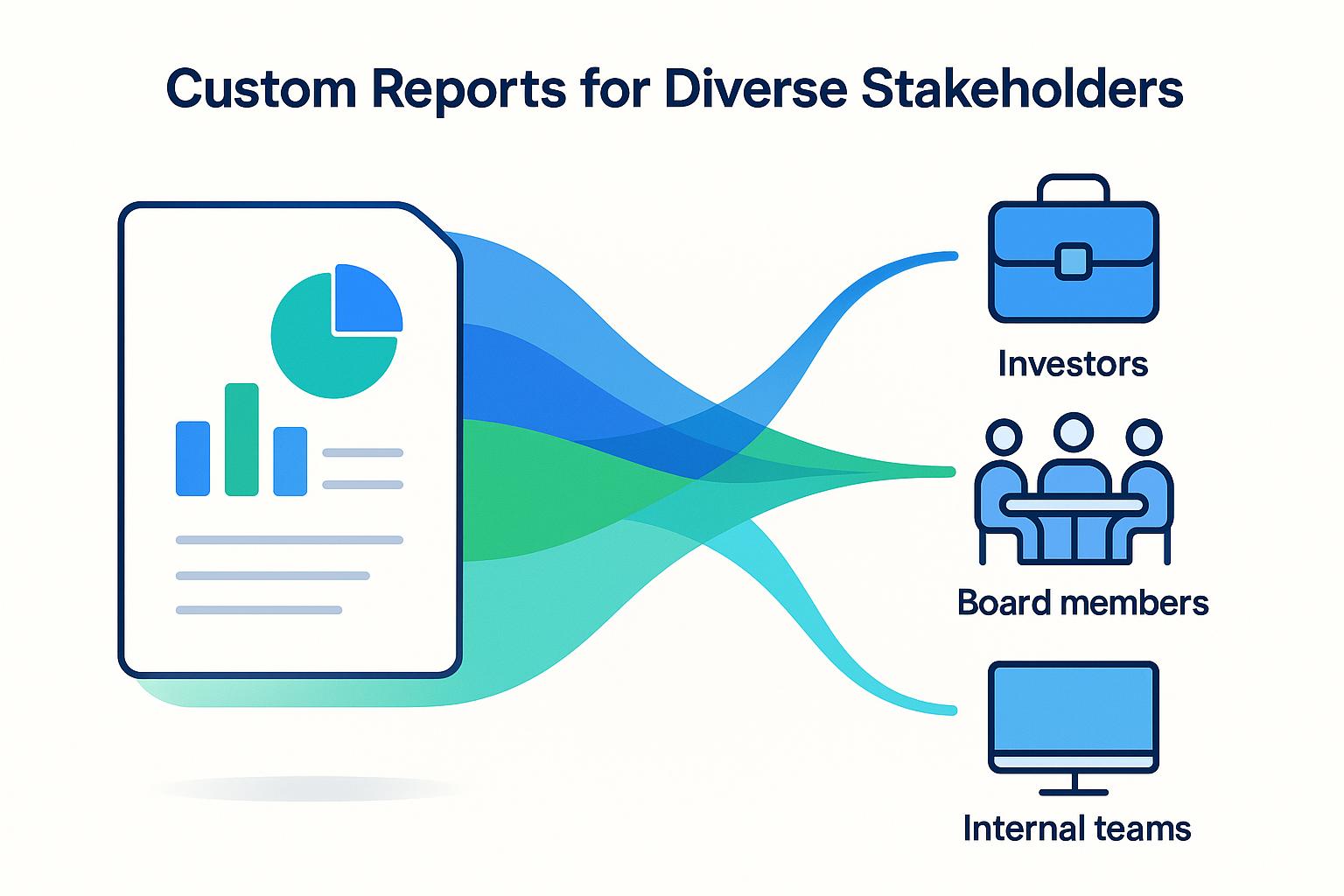Struggling with messy finances or time-consuming manual processes? Modern AI tools are transforming how startups manage their money. These tools automate tedious tasks like bookkeeping and expense tracking while offering real-time insights into cash flow, spending trends, and revenue forecasts. Startups can now predict financial challenges, spot cost-saving opportunities, and prepare investor-ready reports with ease.
Key highlights:
- Real-time tracking: Monitor cash flow, burn rate, and spending patterns instantly.
- Expense management: Automatically categorize transactions and flag anomalies.
- Scenario planning: Model financial outcomes for hiring, fundraising, or market expansion.
- Simplified compliance: AI ensures accurate tax filings and regulatory adherence.
- Slack integration: Access financial data and alerts directly in your communication tools.
AI financial tools like Lucid Financials combine automation with expert oversight, offering startups affordable, enterprise-level financial management starting at $150/month. They're helping founders focus less on spreadsheets and more on scaling their businesses.
How AI Is Revolutionizing Finance for Startups
How AI Analyzes Financial Behavioral Patterns
AI is reshaping how startups understand their financial habits by digging deep into every transaction and uncovering patterns that traditional methods often miss. Instead of relying on periodic reports, AI provides continuous monitoring, giving businesses a real-time view of their financial behavior and identifying trends that can have a significant impact on their growth.
What makes AI so powerful is its ability to handle massive amounts of historical and real-time data at the same time. This capability allows it to track past behaviors, explain why they happened, and even predict future trends. By doing so, AI paints a detailed picture of a startup’s financial health, from spending habits during different growth phases to seasonal shifts in cash flow.
Machine learning plays a key role here, extracting complex patterns and forecasting revenue and cash flow trends using both historical data and current market conditions.
Understanding Spending and Cash Flow Trends
AI is particularly effective at identifying spending patterns that reveal critical insights about a startup's financial health. It doesn’t just track where the money is going - it also highlights recurring expense cycles and connects them to specific business activities. For instance, AI might notice increased marketing expenses during a product launch and link them to subsequent revenue growth.
Beyond that, AI provides real-time updates on payment schedules, helping businesses manage liquidity and avoid cash shortfalls. It also simplifies expense management by automatically categorizing transactions and flagging duplicate charges.
By continuously monitoring financial activity, AI uncovers seasonal and cyclical trends. For example, a SaaS company might see a drop in subscription renewals at certain times of the year, while a B2B business may notice client purchasing slows during the holidays. These insights allow founders to adjust their financial strategies and better navigate slower periods.
AI can also identify opportunities to cut costs and improve efficiency. For example, it might suggest consolidating purchases to save money or flag unexpected expense spikes that could indicate operational inefficiencies. While these insights help refine financial planning, AI also acts as a safeguard, alerting businesses to deviations from expected financial behavior.
Detecting Anomalies in Financial Behavior
AI doesn’t just analyze patterns - it also spots irregularities that could signal potential problems. By establishing a baseline for normal financial activity, AI can quickly flag deviations that fall outside expected ranges. This early warning system gives startups the chance to address issues before they spiral out of control.
For example, AI-powered fraud detection systems monitor spending behaviors in real time, identifying unusual activity and reducing financial risks. Over time, these systems become even more accurate as they refine their understanding of what constitutes normal behavior.
Unusual expense patterns, like sudden spikes, are flagged for immediate review. Similarly, unexpected changes in recurring revenue or shifts in customer payment schedules trigger alerts, ensuring that potential problems are addressed promptly.
AI also makes cash flow irregularities easier to spot. By tracking typical payment cycles and conversion timelines, it can alert businesses to overdue payments or unusual surges in receivables. This allows founders to proactively engage with customers rather than reacting after problems arise.
On top of that, AI can highlight inefficiencies that might otherwise go unnoticed. For instance, it could detect rising costs for services like cloud computing or flag contractor payments that don’t align with deliverables. These insights help startups fine-tune their spending before inefficiencies turn into major financial drains.
What makes AI even more effective at anomaly detection is its ability to cross-check data from multiple sources. By correlating unusual spending with external factors like market trends or seasonal changes, AI reduces false alarms and ensures that genuine issues get the attention they deserve. This capability gives startups a clearer, more accurate understanding of their financial health.
Key AI Technologies for Financial Clarity
The surge of AI in startup finance is driven by three key technologies that work in harmony to transform raw data into clear, actionable financial insights. These tools do more than just automate tasks - they reshape how startups manage their finances.
Each technology plays a specific role in achieving financial clarity. Machine learning dives into historical data to predict trends and uncover patterns. Natural language processing (NLP) organizes unstructured documents into searchable, structured data. Automated reconciliation systems ensure accuracy and eliminate the drudgery of manual bookkeeping. Together, these technologies create a real-time financial intelligence system. Let’s explore how each one contributes to this transformation.
Machine Learning for Predictive Insights
Machine learning takes startup financial planning to the next level by turning past data into actionable forecasts. Unlike basic trend analysis, machine learning algorithms examine multiple variables to reveal hidden financial connections.
For example, machine learning refines revenue forecasts and cash flow predictions by analyzing factors like seasonal trends, customer behavior, and payment patterns. Imagine detecting seasonal spikes in customer acquisition costs or variations in conversion rates - this allows startups to fine-tune their marketing strategies for maximum impact.
It also helps optimize expenses. By analyzing vendor contracts, usage patterns, and relationships, machine learning can highlight underutilized resources or suggest consolidating vendors for better pricing. These insights directly enhance a startup’s ability to manage its finances effectively.
Natural Language Processing in Financial Document Analysis
NLP simplifies the often-overwhelming task of handling financial documents by turning unstructured text into usable data. This technology extracts key information from contracts, invoices, and financial statements, making document analysis faster and more efficient.
For instance, contract analysis becomes a breeze when NLP tools scan legal documents to identify crucial details like payment schedules, renewal dates, or penalty clauses. Startups with multiple vendor relationships can benefit from automated alerts for upcoming renewals or terms that might need renegotiation.
Invoice processing is another area where NLP shines. Instead of manually entering data, NLP systems extract essential information - such as amounts, dates, and vendor details - from invoices, categorizing expenses according to the startup’s financial framework. This not only saves time but also minimizes errors.
Searching through financial records also becomes far more effective. NLP allows startups to query document content directly, making it easy to locate records tied to specific vendors, projects, or expense categories. This capability streamlines audits and financial reviews.
Additionally, NLP supports compliance efforts by scanning documents for regulatory requirements and flagging potential issues like missing paperwork or irregularities. This ensures startups stay on top of their financial obligations.
Automated Reconciliation and Reporting
Automated reconciliation eliminates one of the most tedious aspects of financial management by keeping records accurate and up to date. These systems go beyond simple transaction matching, providing continuous financial oversight.
For example, bank reconciliation happens automatically, with systems matching transactions across accounts and flagging discrepancies in real time. Instead of waiting for month-end processes, startups get immediate alerts when mismatches occur, enabling quick resolution. Financial data from payment processors, banks, and expense tools integrates seamlessly into a unified view.
Real-time reporting is another game-changer. Dashboards update automatically with key metrics like cash balance, recurring revenue, and burn rate, giving founders an up-to-the-minute view of their financial health without relying solely on periodic reports.
Automated systems also maintain a detailed audit trail, tracking every transaction and documenting any changes. Continuous error detection flags unusual activity, duplicate entries, or inconsistencies, ensuring issues are caught and addressed early - before they affect overall accuracy.
Real-Time Financial Insights and Scenario Planning
AI gives startups an edge by delivering instant financial insights and enabling proactive planning. Unlike traditional financial management, which often depends on monthly or quarterly reports, AI-powered tools provide continuous monitoring and forward-looking analysis. This allows startups to make informed decisions as situations unfold.
This shift changes how startups handle financial planning. Instead of waiting to address problems after they arise, founders can predict challenges and spot opportunities before they impact the business. Just as behavioral insights guide strategy, real-time financial data helps shape decisions and ensures financial plans grow alongside the business. These insights also include real-time alerts, keeping founders informed every step of the way.
Real-Time Alerts and Metrics
AI-driven financial systems excel at keeping tabs on key metrics and sending alerts when something needs attention. These alerts go beyond simple notifications, offering detailed insights into financial health.
Cash flow monitoring is one of the most critical applications. AI tracks daily cash movements and flags potential risks, such as trends that could lead to cash flow issues.
Burn rate analysis becomes much more precise with AI. The system doesn’t just track overall spending but pinpoints specific areas driving increased costs. For instance, if software subscriptions jump by 40% in a month or marketing expenses spike unexpectedly, founders receive immediate alerts explaining the cause.
Revenue pattern recognition helps startups stay on top of growth metrics. AI systems can identify when recurring revenue growth slows, customer churn rises, or payment delays increase. These insights are delivered in real time, not weeks later during a monthly review.
Modern AI platforms also enhance these alerts through seamless integration. For example, Lucid Financials integrates directly with Slack, allowing founders to receive alerts and even ask questions about financial data without leaving their primary communication tool. This integration ensures decision-makers have instant access to critical information, wherever they are.
Expense anomaly detection adds another layer of oversight by flagging unusual spending patterns, helping to prevent unauthorized or error-prone transactions.
AI-Driven Scenario Planning
Beyond real-time alerts, AI reshapes financial forecasting by turning static projections into dynamic, actionable scenarios. This approach is especially useful during uncertain times or when making major decisions.
AI enables startups to model various scenarios, such as the impact of different fundraising amounts or hiring plans, to predict cash flow and growth. For example, fundraising scenario modeling lets startups evaluate outcomes like raising $2 million versus $5 million, showing how each option influences runway, hiring capacity, and growth potential.
Hiring impact analysis provides clarity on how team growth affects finances. For instance, startups can compare hiring five engineers versus a mix of engineers and marketers. AI models account for not just salaries but also benefits, equipment costs, and the time it takes for new hires to become fully productive.
Market expansion planning becomes more data-driven with AI. Startups can model costs and timelines for entering new markets, comparing gradual expansion to aggressive multi-market launches. These models consider marketing expenses, local hiring needs, and revenue projections based on similar past efforts.
For product development investment, AI helps allocate resources wisely. Startups can weigh the benefits of focusing on new features versus customer acquisition, with models showing how each choice affects user growth, revenue, and competitive standing over time.
AI also supports stress testing financial assumptions. Models can simulate challenges like economic downturns, increased customer churn, or supply chain disruptions. This helps startups identify potential weaknesses and prepare contingency plans before issues arise.
Real-time scenario updates ensure forecasts remain relevant as conditions change. Unlike static spreadsheets, AI scenarios update continuously with new data, keeping plans current and actionable as the business evolves.
sbb-itb-17e8ec9
Implementing AI Financial Tools in Startups
Bringing AI financial tools into a startup's operations isn't just about installing new software. It involves aligning these tools with existing workflows, ensuring data is accurate and consistent, and adjusting team practices to make the most of AI-driven insights. Unlike traditional software, AI systems thrive on high-quality data and often require teams to adapt their routines to accommodate automated processes.
Integration with Existing Systems
For AI financial tools to deliver real value, they need to work seamlessly with the systems startups already depend on. The goal is to create unified workflows, not to burden teams with disconnected platforms.
Take accounting, for example. A well-integrated AI system can connect directly to your current accounting setup, pulling transaction data automatically, categorizing expenses, and updating financial records in real time. This eliminates the need for manual data entry and ensures the system operates with up-to-date information.
Banking integration adds another layer of efficiency. By linking AI tools directly to business bank accounts, startups can monitor cash flow in real time, categorize transactions automatically, and flag unusual activity. This provides immediate updates on cash positions, making reconciliation faster and more accurate.
AI tools can also integrate with communication platforms like Slack, allowing team members to access insights, receive alerts, and generate reports without leaving their primary workspace. Additionally, connecting these tools with CRM, sales, and payroll platforms ensures financial data is harmonized across the board. This means revenue trends, customer behavior, salary expenses, and tax obligations are all accurately reflected in financial forecasts.
Most of these integrations rely on pre-built APIs, which simplify setup and keep data synchronized automatically.
Data Quality and Security Considerations
AI tools are only as good as the data they analyze. Poorly maintained or inaccurate data can lead to unreliable insights and flawed decisions, so keeping data clean and consistent is critical.
Startups often find their financial records riddled with errors, duplicates, or inconsistent categorizations. Cleaning this data before implementing AI tools is essential for generating trustworthy results. Historical data also plays a big role - many AI tools need a significant amount of past data to provide meaningful insights. For startups with incomplete records, reconstructing past financial data can be a worthwhile investment.
Ongoing data reviews are equally important. Regularly validating flagged transactions and updating business rules ensures the system continues to deliver accurate insights over time. Routine checks can catch issues before they affect financial reporting.
Security is another key consideration. Protecting sensitive financial data requires robust encryption, both during transmission and when stored, as well as strict access controls. Complying with security standards is non-negotiable for any AI implementation.
Backing up data and having recovery procedures in place are also essential. Regular backups and tested recovery plans minimize the risk of data loss and ensure quick recovery from technical issues. Comprehensive audit trails that log every change made by the AI system further enhance transparency and support compliance.
Change Management for Teams
Switching to AI financial tools often means rethinking how teams work. For those used to manual processes, trusting automated insights can be a big adjustment.
Training is a key part of this transition. Hands-on sessions that simulate real business scenarios can help teams learn how to interpret AI-generated insights and feel more comfortable using them in decision-making.
A phased rollout can also make the shift smoother. Many startups start small, using AI for specific tasks like expense categorization or cash flow tracking, before expanding to more complex applications like predictive analytics or scenario planning.
It's important to clarify how AI tools fit into the bigger picture. By defining roles and responsibilities, teams can see how these tools enhance their work rather than replace it. Successful implementations use AI to make human decision-making more efficient, not obsolete.
Clear communication is crucial throughout the process. Regular updates on the system's progress and benefits - like improved accuracy, time savings, or actionable insights - can help build trust. Sharing examples of how AI tools have prevented problems or uncovered opportunities can further demonstrate their value.
Finally, establishing feedback channels allows teams to share their experiences and suggest improvements. Setting measurable goals, such as reducing reporting time or increasing categorization accuracy, provides a clear path for refining the system. With proper integration, reliable data, and team readiness, startups can unlock the true potential of AI for financial clarity.
Case Study: How Lucid Financials Empowers Startups

Lucid Financials is transforming how startups manage their finances by combining AI-driven tools with professional expertise. Their approach simplifies financial management for startups and fast-growing companies, making it easier for founders to focus on scaling their businesses.
Lucid Financials' AI-Powered Full-Stack Financial Management
Lucid Financials stands out as the first AI-powered full-stack accounting firm specifically designed for startups. It consolidates essential services like bookkeeping, tax management, R&D credits, forecasting, and CFO support into one smart system. This eliminates the need for juggling multiple financial tools, streamlining operations for busy entrepreneurs.
The platform automates financial recordkeeping, giving founders more time to focus on growth. It also provides comprehensive tax services, including efficient filings, maximizing R&D credits, and handling complex scenarios like equity compensation and grants.
With pricing starting at $150 per month, Lucid Financials offers a transparent, budget-friendly option for early-stage companies. There are no hidden fees or hourly billing, making enterprise-level financial management accessible to startups.
"Lucid has made it easy to track spending, plan ahead, and handle our growth. It's straightforward." - Aviv Farhi, Founder and CEO @Showcase
The AI system also handles automated transaction matching and reconciliation, ensuring clean and accurate books within just seven days of onboarding. This integrated approach provides real-time insights, helping founders stay ahead of financial challenges.
Real-Time Insights and Slack-Based Support

Lucid Financials integrates directly with Slack, allowing founders and team members to access financial insights without leaving their primary communication tool. Whether it’s checking runway, tracking spending, or evaluating performance, users can get instant AI-powered responses.
The platform continuously monitors financial data, offering real-time updates on burn rate and runway, which are critical for making informed decisions. Additionally, it delivers industry benchmarks like customer acquisition cost (CAC), valuation metrics, and competitor insights, tailored to specific sectors and product categories.
"Managing my finances has become much easier with this platform. It's user-friendly and efficient, saving me a lot of time and effort." - Aviv Farhi, Founder and CEO @Showcase
For more complex financial issues, Lucid Financials seamlessly connects users with experienced finance professionals. This blend of AI efficiency and human expertise ensures that even challenging scenarios are handled effectively.
Investor-Ready Reporting and Tax Expertise
Lucid Financials simplifies fundraising and investor relations by generating investor-ready reports with just one click. These reports are always up-to-date, saving startups from the time-consuming preparation typically required for fundraising or due diligence.
The platform also creates detailed fundraising plans, cash flow projections, and scenario models, providing the kind of strategic guidance that usually demands a dedicated CFO. These tools give startups a competitive edge when engaging with investors or boards.
For tax management, Lucid Financials handles complex founder-specific scenarios, such as equity compensation, grants, and multi-entity setups. The AI proactively identifies opportunities for tax savings and flags compliance risks before they become issues.
"We found a powerful yet simple solution for our financial planning needs, which has been a great addition to our business." - Refael Shamir, Founder and CEO @Letos
Security is a major priority, with the platform maintaining SOC 2 compliance to protect sensitive financial data. This ensures startups meet both investor and regulatory requirements while keeping their information safe.
"As our company grows, budgeting and cash flow management have become crucial. The features provided are essential and have greatly streamlined these processes for us." - Luka Mutinda, Founder and CEO @Dukapaq
Every AI-generated output is reviewed by finance professionals to ensure accuracy and compliance. By combining the speed of AI with the precision of expert oversight, Lucid Financials helps startups achieve financial clarity and confidence in record time. This seamless integration of technology and human expertise is setting a new standard for financial management.
Conclusion: Achieving Financial Clarity with AI
The financial landscape for startups is evolving rapidly, and AI tools have become a cornerstone for both survival and growth. In fact, the AI accounting market is expected to grow from $1.5 billion in 2021 to $53.9 billion by 2030.
Why the shift? Because AI delivers results that startups can see right away. By automating routine tasks like data entry, invoicing, and reconciliation, AI slashes processing time. These platforms also offer instant insights into cash flow, expenses, and profitability. This means startups can move from simply reacting to financial challenges to planning ahead with dynamic forecasting. Instead of waiting weeks for monthly reports, founders can now base decisions on real-time data.
AI also makes financial management more affordable. By reducing the need for large accounting teams, startups can access enterprise-level tools at prices that fit their budgets. Financial services companies are already seeing a 4.2x return on their generative AI investments. Generative AI, for instance, can cut up to 80% of the time spent on financial reconciliation while improving accuracy. It even transforms compliance and risk management into proactive, strategic processes.
As digital payments continue to grow by 15% annually, startups that adopt AI-driven financial tools will be better equipped to scale efficiently. These technologies simplify today’s financial complexities while preparing businesses for the challenges of tomorrow.
FAQs
How do AI tools help startups improve financial management?
AI tools are changing how startups handle their finances by offering real-time insights and predictive analytics. This means startups can make decisions faster and with greater confidence. Traditional methods often involve tedious processes and are more prone to mistakes, but AI steps in to automate tasks like bookkeeping and financial forecasting, saving both time and money.
These tools also excel at spotting unusual patterns in financial data, ensuring reports are accurate and always up to date. By using AI, startups can adapt quickly to changes, plan with greater precision, and stay prepared for investors - all while dedicating more energy to growing their business instead of wrestling with manual financial tasks.
How can AI-driven financial insights help startups grow and plan effectively?
AI-powered financial tools bring real-time visibility to startups, enabling them to better understand their financial landscape and make informed decisions. By examining data patterns, AI pinpoints areas where costs can be trimmed, revenue increased, and investments strategically directed. This means startups can manage their resources more effectively and maintain a competitive edge.
Additionally, AI improves forecasting precision by analyzing historical data and trends. This helps startups anticipate potential hurdles, prepare for risks, and quickly adjust to market shifts. These insights not only reveal overlooked opportunities but also streamline planning efforts, paving the way for consistent growth.
How do AI tools maintain data security and ensure accuracy when working with startup systems?
AI tools play a key role in keeping data secure and ensuring precision through advanced threat detection and real-time monitoring. These systems actively identify and mitigate potential risks while using automated methods to classify and safeguard sensitive information. This approach helps businesses comply with data regulations and maintain the integrity of their operations.
By working effortlessly with existing startup systems, these tools minimize manual mistakes and deliver consistent, dependable financial data. Their capability to analyze patterns and adjust to changing risks allows startups to manage their finances with confidence, freeing them to concentrate on growth.


